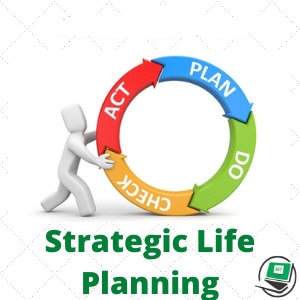 |
Strategic Life Planning |
Strategic planning is without doubt one of the main factors responsible for the continued success of an organisation and often distinguishes organizations that succeed from those that don't especially in the long term. Strategic planning, as an integral aspect of strategic management, enables organizations to define corporate objectives, adapt to their environment and remain competitive in the market place. Our focus in this article is not on strategic planning for an organisation but for the individual. Any organisation whether business or non-business is essentially made up of its people (in the same way that a family or social club is basically its members) and not necessarily its material and financial resources. This is the reasoning behind the generally accepted notion that the most valuable assets of an organisation are its people or human resources. This idea has several implications for both the individual and the organisation:
- Many of the principles and ideas on which organizations are built and run also apply to the individual. Just like organizations plan and prepare for the future, individuals should also do same. Also, what a Gantt chart is to an organisation is what a to-do list is to an individual.
- The quality and intelligence of the people who run an organisation is central to its effectiveness and productivity. Great leaders build great organizations. It is only logical that those at the senior management level earn so much because they are the lifeblood of the organisation.
- Altering the mindset and orientation of people is key to managing change within an organization. Organizational development would most likely succeed when people are actively involved in and support the change management process
Strategic life planning simply means enabling an individual to prepare for the future using the resources, skills, qualities and opportunities that are available to that individual. It is not enough to write down our goals as individuals; there are other things that directly or indirectly impact the setting and achievement of our personal goals. To aid our understanding of strategic life planning, we will use a few questions to unravel the various aspects of the process. The following questions even though have not been presented in a particular order can guide you in preparing a strategic life plan for yourself;
- Who are you? - this question focuses on your personality and helps you to identify your personal qualities (which comprises strengths and weaknesses), temperament (for instance, introvert or extrovert) and other natural traits. Psychometric tests can be very useful with regards to this.
- What can you do? - this question is really about what you can do and not what you are. It helps you to identify your abilities (both potential and realized) and qualifications (whether academic or professional). Potential abilities are your talents while realized abilities are your skills. It takes training and practice to convert the former into the latter.
- Where have you been? - this question gives you a good understanding of past lessons and experiences that are of benefit to your future. This helps you avoid repeating personal mistakes of the past and better still avoiding the mistakes of others. To accomplish this, you need to meditate (on an occasional basis) about the things you have passed through.
- Where are you going to? - this is about setting individual goals for the short and long term. Setting goals in the form of general targets or aims is not sufficient; you should translate them to specific, measurable and time-bound goals. Everyone has personal dreams or wishes but only a few can draw up a plan with achievable goals
- How will you get there? - this is about identifying strategies and tactics that would enable you to achieve your personal goals and objectives. Different individuals may have similar targets but differing strategies for realizing them. Strategies may also be altered along the way for effectiveness
- Who do you know? - this question helps you to highlight contacts and relationships that are of benefit to you now and in the near future. Your personal network can give you leverage in many ways than one and enable you to accelerate towards your personal goals and objectives. A useful network of people is a form of CAPITAL.
- What are the factors affecting you? - you need to be able to thoroughly scan your environment and identify any factor that may be facilitating or limiting your progress or advancement as an individual. Without a knowledge of these factors, you may not be able to pinpoint what works for you and what doesn't or even determine what you can do about them.
- Who do you affect? - you should be able to identify those individuals and groups that are impacted by what you do and the kind of impact you want to have on them. As a manager, for instance, you may want to have a positive impact on your superiors, subordinates and indeed your employer. This is an important aspect of your strategic life plan because you need people around you to climb up the ladder of achievement.
Strategic life planning is vital to realizing the personal vision and mission of an individual. You must carefully think through each aspect to draw up a balanced and coherent strategic life plan for yourself. It may take considerable effort and time to prepare such a plan, but the outcome will be worth it. Above all, your attitude and determination to execute the plan is just as important as the amount of effort invested in preparing it.
The future will eventually show up whether we prepare for it or not, so it makes a lot of sense to plan. In the same way that strategic planning has enabled some organizations to remain in existence for centuries, strategic life planning can also help an individual to accomplish a lot during his/her lifetime and leave an impressionable legacy for future generations. The future starts now!
Enjoy this article? Feel free to share your comment, idea or opinion in the comment section
Related Articles

|
Gain Report: Nigeria - Agricultural finance and developmentReport Highlights: Nigeria's agricultural development is constrained by the lack of access to credit for the predominantly smallholder farmers. Efforts by successive governments to address the problem have been largely unsuccessful. Commercial banks in the country perceive agricultural finance t [Read more]
|
Posted: 15 years ago |

|
Decision-Making - Unlocking the Power of Choice in Your Life!Are you tired of making decisions that lead to dead ends? Do you ever wonder if there are better ways to make decisions, one that will benefit you and your organization in the long run? You are not alone!
Decision-making is the process of choosing a course of action from a range of alternati [Read more]
|
Posted: 3 years ago |

|
Nigeria monetary policy review - Maiden edition 2010
I am delighted to introduce this maiden edition of the Central Bank of Nigeria (CBN) Monetary Policy Review (MPR)produced by the Monetary Policy Department. Although much has been written on the monetary policy process and implementation in Nigeria, there remains considerable scope for further in [Read more]
|
Posted: 16 years ago |


